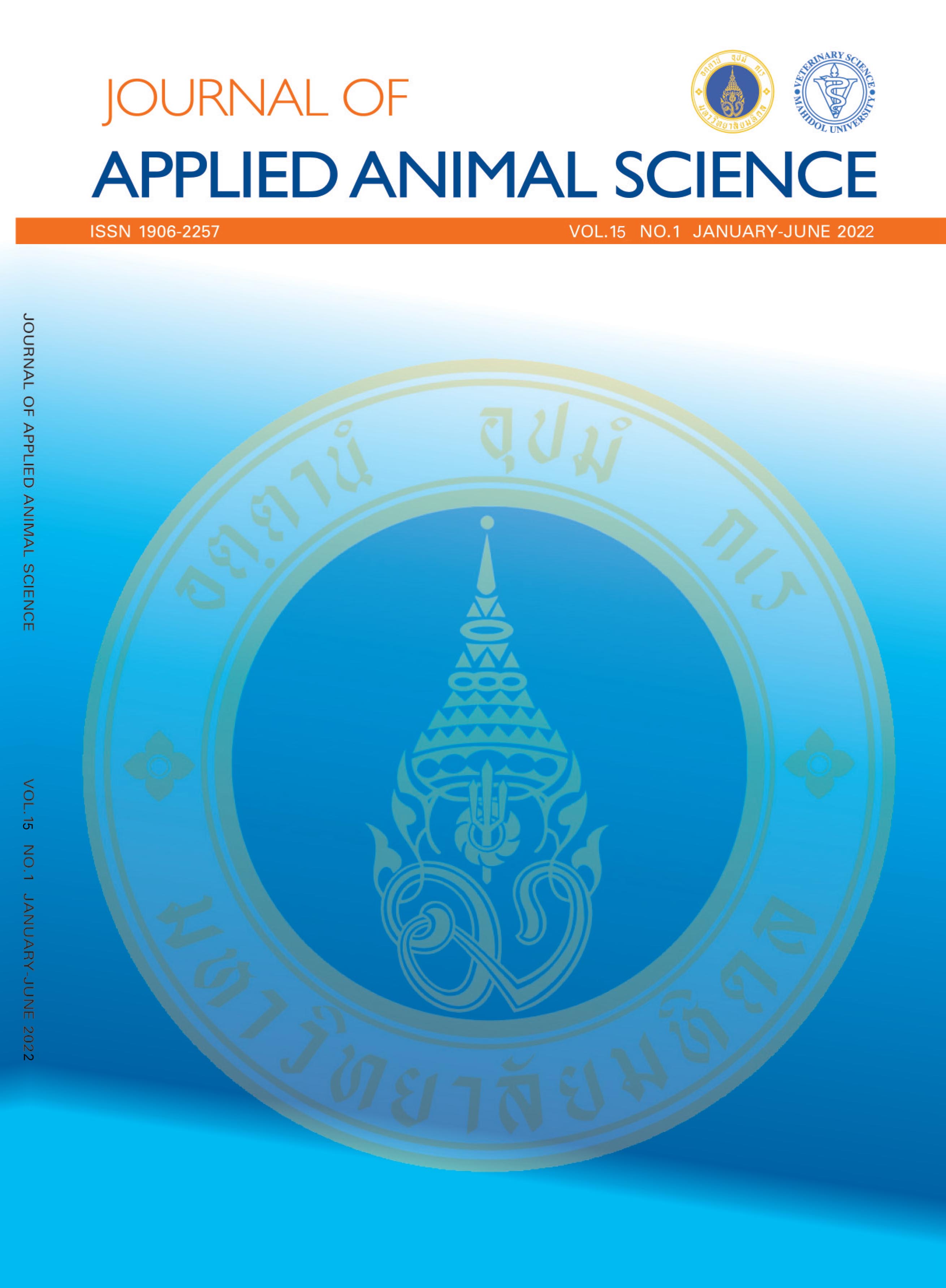A Preliminary In Vitro Study on the Effect of Zika Virus Strains on the Quality of Boar Sperm
Keywords:
Zika virus, pigs, sperm, strainsAbstract
A million people in various countries have been infected by the Zika virus (ZIKV). Sexual transmission is one of the human infectious transmissions. ZIKV causes neurological disease and microcephaly in infants whose mothers have been infected. Domestic pigs were used as an experimental model because the symptoms of ZIKV-infected piglets are similar to humans. Nowadays, minimal evidence of ZIKV infection in boar semen has been published, and there is no data on the effect of ZIKV strains. Thus, this study compares the quality of boar semen infected by different ZIKV strains. The fresh semen from two boars were collected by gloved-hand technique. The quality of the semen was determined and it was separated into three groups: a non-infected semen (mock) group, and two ZIKV-infected semen groups (strains SV0010/15, and SV0127/14). Then, at 2, 24, 48, and 72 hours after infection, the sperm viability and acrosomal integrity were assessed using Eosin-nigrosin and FITC-PNA, respectively. The morphology of head and tail sperms was determined using William’s stain and formal saline, respectively. The results indicated that there were no significant differences in the quality of boar semen between groups (P > 0.05), but that sperm head and tail abnormalities trended to be increased overtime in all groups. In conclusion, the boar sperm may be not a target cell of ZIKV. Thus, additional samples for further research on the ZIKV receptor in sperm should be acquired.
References
Agumadu VC, Ramphul K. Zika virus: A review of literature. Cureus. 2018;10(7):e3025.
Bagasra O, Addanki KC, Goodwin GR, Hughes BW, Pandey P, McLean E. Cellular targets and receptor of sexual transmission of zika virus. Appl Immunohistochem Mol Morphol. 2017;25(10):679-86.
Buathong R, Hermann L, Thaisomboonsuk B, Rutvisuttinunt W, Klungthong C, Chinnawirotpisan P, et al. Detection of zika virus infection in Thailand, 2012-2014. Am J Trop Med Hyg. 2015;93(2):380-3.
Buranaamnuay K. Comparison of different methods for sperm vitality assessment in frozen-thawed Holstein bull semen. Thai J Vet Med. 2019;49(3):249-55.
Calvet GA, Kara EO, Giozza SP, Bôtto-Menezes CHA, Gaillard P, de Oliveira Franca RF, et al. Study on the persistence of Zika virus (ZIKV) in body fluids of patients with ZIKV infection in Brazil. BMC Infect Dis. 2018;18(1):49.
Chanapiwat P, Kaeoket K. l-cysteine prolonged fresh boar semen qualities, but not for docosahexaenoic acid. Czech J Anim Sci. 2021;66(1):21-8.
Chanapiwat P, Kaeoket K. The effect of Curcuma longa extracted (curcumin) on the quality of cryopreserved boar semen. Anim Sci J. 2015;86(9):863-8.
Da Silva LRC. Zika virus trafficking and interactions in the human male reproductive tract. Pathogens. 2018;7(2):51.
Darbellay J, Lai K, Babiuk S, Berhane Y, Ambagala A, Wheler C, et al. Neonatal pigs are susceptible to experimental Zika virus infection. Emerg Microbes Infect. 2017;6(2):e6.
Ellison DW, Ladner JT, Buathong R, Alera MT, Wiley MR, Hermann L, et al. Complete genome sequences of zika virus strains isolated from the blood of patients in Thailand in 2014 and the Philippines in 2012. Genome Announc. 2016;4(3):e00359-16.
Horcharoensuk P, Yang-en S, Chakritbudsabong W, Samatiwat P, Pramong R, Rungarunlert S, et al. Melatonin attenuates dimethyl sulfoxide– and zika virus–induced degeneration of porcine induced neural stem cells. In Vitro Cell Dev Biol Anim. 2022;58(3):232-42.
Joguet G, Mansuy JM, Matusali G, Hamdi S, Walschaerts M, Pavili L, et al. Effect of acute zika virus infection on sperm and virus clearance in body fluids: a prospective observational study. Lancet Infect Dis. 2017;17(11):1200-8.
Kaeoket K, Chanapiwat P, Tummaruk P, Techakumphu M. Supplemental effect of varying L-cysteine concentrations on the quality of cryopreserved boar semen. Asian J Androl. 2010;12(5):760-5.
Kawai Y, Nakayama E, Takahashi K, Taniguchi S, Shibasaki KI, Kato F, et al. Increased growth ability and pathogenicity of American- and Pacific-subtype zika virus (ZIKV) strains compared with a Southeast Asian-subtype ZIKV strain. PLoS Negl Trop Dis. 2019;13(6):e0007387.
Klaitong P, Smith DR. Roles of non-structural protein 4A in flavivirus infection. Viruses. 2021;13(10):2077.
Lazear HM, Diamond MS. Zika virus: new clinical syndromes and its emergence in the western hemisphere. J Virol. 2016;90(10):4864-75.
Luplertlop N, Suwanmanee S, Ampawong S, Vongpunsawad S, Poovorawan Y. In vitro study of Zika virus infection in boar semen. Arch Virol. 2017;162(10):3209-13.
Mansuy JM, Suberbielle E, Chapuy-Regaud S, Mengelle C, Bujan L, Marchou B, et al. Zika virus in semen and spermatozoa. Lancet Infect Dis. 2016;16(10):1106-7.
Petersen LR, Jamieson DJ, Powers AM, Honein MA. Zika Virus. N Engl J Med. 2016;374(16):1552-63.
Rashid M-u, Zahedi-Amiri A, Glover KKM, Gao A, Nickol ME, Kindrachuk J, et al. Zika virus dysregulates human Sertoli cell proteins involved in spermatogenesis with little effect on tight junctions. PLoS Negl Trop Dis. 2020;14(6):e0008335.
Rastogi M, Sharma N, Singh SK. Flavivirus NS1: a multifaceted enigmatic viral protein. Virol J. 2016;13:131.
Ratchamak R, Vongpralub T, Boonkum W, Chankitisakul V. Cryopreservation and quality assessment of boar semen collected from bulk samples. Vet Med. 2019;64(5):209-16.
Sornjai W, Jaratsittisin J, Auewarakul P, Wikan N, Smith D. Analysis of Zika virus neutralizing antibodies in normal healthy Thais. Sci Rep. 2018;8(1):17193.
Wichgers Schreur PJ, van Keulen L, Anjema D, Kant J, Kortekaas J. Microencephaly in fetal piglets following in utero inoculation of Zika virus. Emerg Microbes Infect. 2018;7(1):42.
Downloads
Published
How to Cite
Issue
Section
License
Copyright (c) 2022 Mahidol University Faculty of Veterinary Science

This work is licensed under a Creative Commons Attribution-NonCommercial-NoDerivatives 4.0 International License.
Published articles are under the copyright of the Journal of Applied Animal Science (JAAS) effective when the article is accepted for publication. The editorial boards claim no responsibility for the content or opinions expressed by the authors of individual articles in this journal. Partially or totally publication of an article elsewhere is possible only after the consent from the editors.



